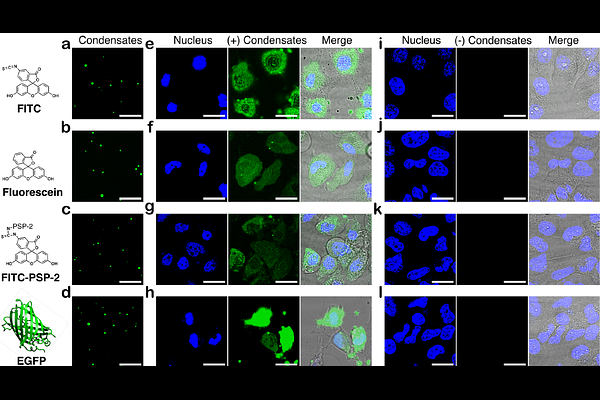Disulfide cross-linked redox-sensitive peptide condensates are efficient cell delivery vehicles of molecular cargo.

Disulfide cross-linked redox-sensitive peptide condensates are efficient cell delivery vehicles of molecular cargo.
Mondal, M.; Swetman, W. S.; Karim, S. U.; Shrestha, S.; Davis, A. M.; Bai, F.; Huang, F.; Clemons, T. D.; Rangachari, V.
AbstractBiomolecular condensates (BCs) are phase-separated viscoelastic hubs within demixed solutions enriched in proteins and nucleic acids. Such condensates, also called membraneless organelles, are increasingly observed in cells and serve as transient hubs for spatial organization and compartmentalization of biomolecules. Along with the transiency of formation and dissolution, their ability to sequester molecules has inspired us to develop BCs as potential vehicles to transport and deliver molecular cargo. We recently reported the design of disulfide bond cross-linked phase-separating peptide (PSP) condensates that spontaneously dissolve in reducing conditions (JACS, 2024, 146, 255299). Based on the premise that the highly reducing cytoplasm could dissolve PSP condensates and release partitioned cargo, here, we demonstrate the ability of PSP condensates to deliver molecular cargo to the cytoplasm of HeLa cells efficiently. We show that PSP condensates deliver a variety of cargos that differ in their sizes and chemistries, including small molecules, peptides, GFP protein (31 kDa), DNA (1.7 kbp), and mRNA. The transfection efficiencies of PSP condensates for delivering DNA and mRNA were also significantly greater than those of a commercial transfection agent. With room to tailor the condensate properties based on cargo and cell types, these results showcase the potential of disulfide-cross-linked PSPs as effective and customizable cellular delivery vehicles, filling a critical demand gap for such delivery systems.